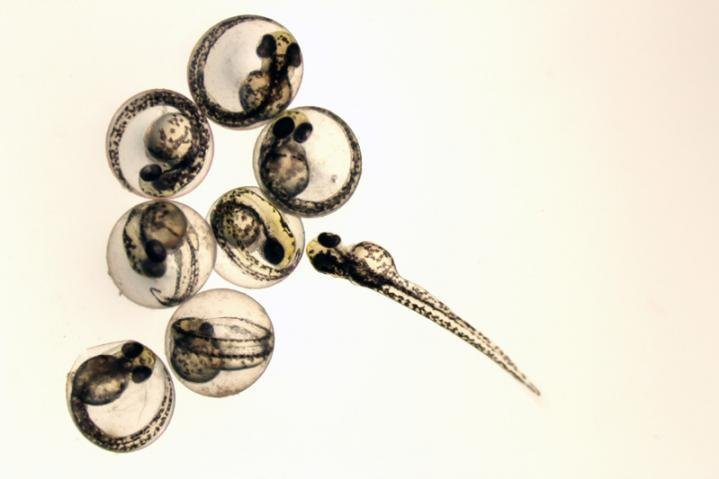On the far right, a zebrafish embryo breaks free from a group of unhatched sibling eggs, a process which researchers at UCLA found is sped up by the chemical BPS, which replaced BPA in the manufacturing of plastic based on the belief it would be more safe. Photo by Zebrafish Lab/UCLA
LOS ANGELES, Feb. 2 (UPI) -- The chemical bisphenol S, or BPS, which replaced bisphenol A, or BPA, in most plastics because of links to cancer, has been shown to speed up embryonic development and disrupts the reproductive system.
Researchers at the University of California Los Angeles report the effects of BPS are similar to those of BPA, according to their recent studies with zebrafish.
The U.S. Food and Drug Administration banned the use of BPA in plastics, and manufacturers switched to BPS because it was thought the chemical would leech out of plastics less than BPA -- which has turned out not to be true.
Recent studies have found BPS can be detected in 81 percent of Americans' urine, showing that it leeches out of plastic, and research is showing it has many of the same effects as BPA.
"Our study shows that making plastic products with BPA alternatives does not necessarily leave them safer," said Nancy Wayne, a reproductive endocrinologist and professor of physiology at the University of California Los Angeles, in a press release. "Our findings are frightening and important -- consider it the aquatic version of the canary in the coal mine."
For the study, published in the journal Endocrinology, researchers exposed zebrafish to BPA and BPS at levels similar to those found in polluted rivers.
Using fluorescent protein tags, researchers collected data as the reproductive endocrine brain cells, responsible for puberty and fertility, developed in the fish. They noted an overstimulation of their reproductive systems, leading to an accelerated egg-hatching time, and premature birth.
The researchers said future studies will focus on overstimulation of the neurons regulating reproduction to see if they lead to premature puberty and disruption of the reproductive system.
"Exposure to low levels of BPA had a significant impact on the embryos' development of brain cells that control reproduction, and the genes that control reproduction later in life," Wayne said. "We saw many of these same effects with BPS found in BPA-free products. BPS is not harmless."















